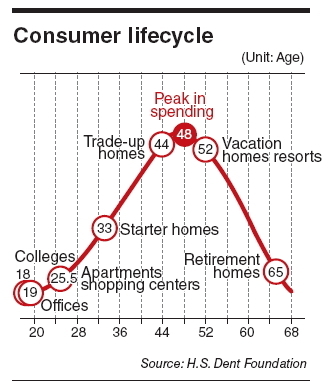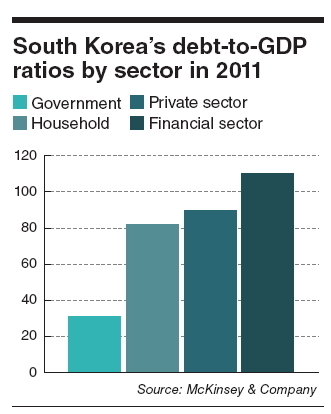Despite the continued economic stimulus policies across the world since the 2008 financial crisis, the global economy is likely to face another crash next year, according to U.S.-based economic forecaster Harry Dent.
He says the world faces three major short-term risks: falling commodity prices, a depression in southern Europe and the bursting of China’s real estate bubble.
Regarding the outlook for the U.S. economy, Dent, who has for decades followed the booms and busts of the global economy, remained skeptical. Baby boomers who led consumption will cut back their spending with retirement, regardless of any kind of stimulus packages. Falling consumption linked with the changing demographic trends will dampen the U.S. economy once again, Dent predicted.

In response to rising concerns over an imminent exit plan by the U.S. Federal Reserve, he said it was not likely that the U.S. Fed would drop its quantitative easing policies soon, as it was not certain that the housing market, a key indicator of economic recovery, would remain as strong as it had been.
Dent also predicted a hard landing for the Chinese economy, pointing to over-investments in every type of infrastructure, in particular the real estate sector and its shadow banking system. He said China may be the most likely trigger for the next global financial crisis.
When it comes to the outlook for the Japanese economy, Dent, who predicted Japan’s decade-long slump in the late 1980s, forecast that the government’s expansionary economic policies, dubbed Abenomics, would have a temporary positive effect on its economy because its demographic trends do point up into 2020. But he warned that continued high levels of stimulus would be dangerous, especially if inflation did rise to Japan’s targeted 2 percent. Japanese bond rates would rise, and then Japan would feel the weight of its massive debt.
Based on his famous demographics method, Dent said Korea shows similar demographic trends with those of Japan, but 22 years behind. Korea’s demographic trends plateau into 2018, then turn negative decades, he added.
The high level of debt of Korean households, will challenge positive short-term demographic trends, Dent noted, saying the 136 percent debt-to-GDP ratio in Korea’s household sector is higher than in most other advanced nations.
To cope with remaining uncertainties, Dent advised Korean companies to get lean and mean quickly. He advised companies to cut fixed costs as much as possible and weed out weak product lines or sell marginal businesses before the next crash. Cash and cash flow are king in a deflationary downturn such as in the 1930s or 2008-2009, he added.
Following are excerpts of an email interview with Harry Dent on the outlook for the global and Korean economy based on demographic trends and economic cycles.
 |
Harry Dent |

Q: According to the Ministry of Strategy and Finance, Korea’s household debt-to-GDP ratio reached 91 percent in 2012. But policymakers in Korea are downplaying some economists’ worries that the nation’s household sector is facing a crisis due to its heavy debt. What is your view on the debt level of Korean households?
A: Korea’s household debt-to-GDP ratio is higher than that of the U.S. and most European countries and Japan. So, this is worrisome. I see the real estate bubble bursting around the world in the next few years and that is what will cause such debt to be felt more by consumers and banks.
Q: Despite the government’s array of stimulus packages, people are reluctant to buy a house, thinking that housing prices will continue to fall. Do you think housing prices will continue to fall in Korea?
A: I see housing falling around the world and Korea is not an exception. Japan’s home prices have fallen now for 22 years without much of a bounce. Demographic trends would suggest that the same will happen in South Korea 22 years after Japan’s peak in 1991 or 2013, this year. A global financial crisis, which I expect between 2014 and 2019, will obviously hurt real estate prices and the economy in Korea as well.
Q: How should Korean companies prepare for the low-growth era and protracted global economic downturn?
A: Companies need to get lean and mean quickly. This is not the time to make major investments in capacity and to raise fixed costs and debt. Companies should cut fixed costs as substantially as possible and weed out weak product lines or sell marginal businesses before the next crash. Cash and cash flow are king in a deflationary downturn like the 1930s or 2008 and 2009.
The strongest companies survive and greatly expand their long-term market share. The weak go under or are bought out at fire sale prices by the stronger companies.
The winter season is the most challenging, but also the most rewarding for companies that see it coming and do have the strongest market share and the lowest costs.
Profile
● U.S.-based economic forecaster Harry Dent, the founder of Dent Research and a best-selling author, is famous for predicting global booms and busts based on demographic trends and their impact on consumer spending.
● He started building his reputation as he predicted in the late 1980s that the Japanese economy would soon enter a slowdown based on an analysis of Japan’s demographic trends.
● In the 1990s, he also forecast the unanticipated boom of the 1990s and the continued expansion into this decade in his book “The Great Boom Ahead.”
● In his recent book “The Great Crash Ahead,” he predicts the next great depression will come between 2014 and 2020.
● Dent received his MBA from Harvard Business School, where he was a Baker Scholar. At Bain and Company, a U.S.-based management consulting firm, he was a strategy consultant for Fortune 100 companies.
● He is the editor of the Survive and Prosper newsletter and created the HS Dent Financial Advisors Network. Dent runs the website www.harrydent.com.
By Seo Jee-yeon (jyseo@heraldcorp.com)







